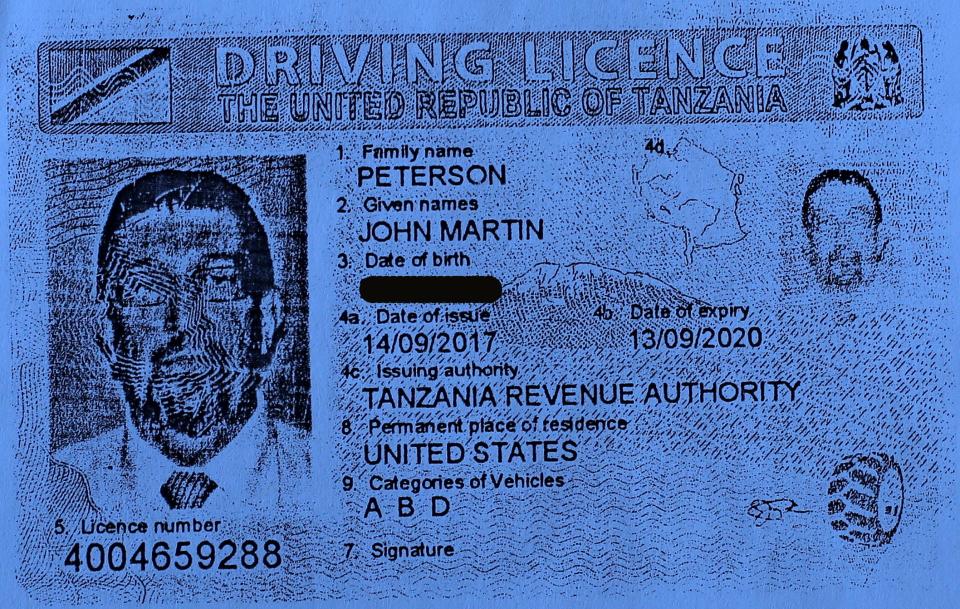A Peace Corps worker made $258,000 after killing a woman. Congress is weighing reforms.
Sweeping Peace Corps legislation headed to the U.S. Senate includes a provision allowing the agency’s director to suspend without pay any employee who engages in serious misconduct.
The proposal follows a USA TODAY investigation that exposed for the first time a leading Peace Corps official who remained on the payroll for 18 months after he went on a reckless drunk driving spree that left a Tanzanian mother dead.
That case was one of several troubling instances behind the provision in the new bill, which was approved by the U.S. Senate Foreign Relations Committee this week, according to Rep. John Garamendi, D-Calif. who introduced the bill in the House.
“We noted that the director did not have sufficient administrative authority to deal with profoundly disturbing problems,” said Garamendi, a former Peace Corps volunteer in Ethiopia.
John Peterson, now 68, received more than $250,000 in salary and bonuses while on leave after he struck and killed street vendor Rabia Issa in 2019. The deadly crash on the streets of Dar es Salaam took place after Peterson was drinking at a bar and brought a sex worker to his government-leased home.

U.S. State Department officials flew Peterson out of the country the same day. He was investigated by the State Department and Peace Corps but never faced charges and resigned in 2021.
In response to criticism following USA TODAY’s investigation, Peace Corps director Carol Spahn noted that federal law does not allow foreign service workers to be suspended without pay while under investigation.
The new provision included in the Peace Corps Reauthorization Act would change that, although it gives the suspended employees the right to appeal and awards back pay and legal fees if they are successful. Garamendi said now that the Senate committee has approved the bill, he expects the House Committee on Foreign Affairs to review it as soon as September.
Night with sex worker preceded fatal crash
Peterson, the agency’s director of management and operations in the east African nation of Tanzania, was drinking at a bar in Dar es Salaam on the morning of Aug. 24, 2019, USA TODAY’s reporting found. State Department and Peace Corps records show that he picked up a sex worker in his diplomatic-plated vehicle, brought her to his home and paid her for sex.
Read More: Records reveal feds misled Tanzanian police after US citizen killed woman in Africa
Later that morning, while driving the woman back to the area where had picked her up, Peterson’s car hit and injured a Tanzanian woman on the street. An angry crowd gathered and Peterson fled in his vehicle, tailed by motorcycle drivers. At a sharp turn, Peterson veered off the road and hit 47-year-old Issa as she tended to the fire at her roadside food stand. The mother of three, pronounced dead at the scene, was her family’s primary breadwinner, relatives told USA TODAY.
Peterson kept driving, with the sex worker still in the passenger seat, and soon ran into a large light post. A State Department security official who came to the crash site noted the stench of alcohol and Peterson’s bloodshot eyes, unsteady footing and slurred speech, according to State Department records obtained by USA TODAY through a records request.

At a nearby police station, Tanzanian police tried to give Peterson a breathalyzer test but stopped after a U.S. embassy security official asserted that Peterson’s diplomatic immunity exempted him from such testing.
Records show Peterson did not have diplomatic immunity, a privilege meant to protect diplomats and their families from unfair punishment in foreign justice systems. Peace Corps employees are not typically granted that exemption.
Police released Peterson from custody, directing him to return to the police station two days later. Instead, U.S. embassy officials that same day put Peterson on a plane and only informed Tanzania’s Ministry of Foreign Affairs of the incident after he had left the country. Peterson never faced charges in Tanzania.
Soon after, the U.S. Department of Justice declined to file charges against Peterson in the United States, saying it did not have jurisdiction because the incident happened outside of the country.
State Department spokesman Vedant Patel in a September 2022 statement to USA TODAY said there was no effort to “deliberately mislead Tanzanian authorities as to Mr. Peterson’s diplomatic status” and blamed the confusion over his immunity on a diplomatic identification card Peterson had been issued by the Tanzania government.
Peterson has repeatedly declined to comment. His attorney, Mark S. Zaid, in a statement last year said there “are several misleading inaccuracies” in the Peace Corps and State Department records, but he did not elaborate.
Why did Peterson stay on the Peace Corps payroll?
Spahn, who took over as acting head of the agency about a year and a half after the incident, has stressed that foreign service workers cannot be suspended without pay while under investigation. But agency officials have declined to say why the investigation into Peterson’s case took so long.
Congress cracked down on lengthy paid administrative leave for most other federal workers in 2016, capping it at 10 days per year to investigate misbehavior.
Records show the Peace Corps’ office of safety and security completed its review of the case in February 2020. The agency then waited seven months to notify Peterson that it planned to revoke his security clearance. Peterson appealed the decision, and roughly five months later a determination sided with the agency.
Before his 30-day window to file a further appeal closed, Peterson resigned. In a 93-word letter to the agency, he expressed his “sincere apologies” for his “unacceptable actions” in Tanzania.
Peterson kept collecting salary while his victims got paltry payouts
Over the 18 months that he was on paid leave, Peterson’s salary, unused vacation time and bonuses added up to more than $258,000.
The agency paid a fraction of that amount to the people he harmed, who each signed settlements in exchange for agreeing to not make any legal claims against the agency or Peterson. The settlement records make no mention of whether the victims, including Issa’s minor children, had their own lawyers, and the Peace Corps has declined to say whether they did.

The sex worker Peterson hired received about $2,200. The first woman Peterson hit, who Tanzanian authorities said was “crushed and severely injured,” was paid roughly $6,500.
Issa’s relatives, who buried their loved one in a cinderblock-walled cemetery, received $13,000.
None of the victims received the $20,000 max that federal law allows the agency to pay in order to settle injury or property damage claims involving its employees and volunteers.
The legislation approved by the Senate Foreign Relations Commission this week does not raise that limit, which has been stagnant since 1978.

What else would the Peace Corps Reauthorization do?
Garamendi said the legislation, which formally reauthorizes the agency for the first time in more than two decades, “provides certainty for the Peace Corps” and makes changes “necessary for the organization to function in the modern world.” The provisions include:
Appropriating $410 million annually to the agency through 2028. In a statement issued by the Senate Foreign Relations Committee, National Peace Corps Association President and CEO Dan Baker called the amount “significantly less than what is needed to expand the program into strategically important regions of the world,” but said he is confident that additional “resources can be added through the appropriations process.”
Extending the agency’s Sexual Assault Advisory Council, which was set to expire in October, through fall 2028. The council, a group of independent experts, was formed following legislation passed in 2011 after Peace Corps volunteers said the agency failed to protect them from sexual violence and mishandled their reports. A 2021 USA TODAY investigation found the agency still failing to manage the threat, at times placing volunteers in dangerous situations and inflicting further trauma by bungling its response to assaults. The new legislation would require the council to issue annual public reports.
Requiring the agency to establish a "safe return to service" process for volunteers whose service is interrupted due to mandatory evacuations. The agency pulled all volunteers from service in early 2020 due to the pandemic, began redeploying them to limited sites in early 2022 and is now active again in more than 50 countries.
Peace Corps Office of Communications Director Charmion Kinder, in a statement, said the agency "has been and will continue to engage with Congress on the Peace Corps Reauthorization Act."
"Peace Corps Director Spahn is committed to evaluating legislative and internal policy changes, where feasible and appropriate, to create lasting operational efficiencies that protect the health and safety of Volunteers," Kinder said.
Tricia L. Nadolny and Nick Penzenstadler are investigative reporters for USA TODAY. Tricia can be reached at tnadolny@usatoday.com or on Twitter at @TriciaNadolny. Nick can be reached at npenz@usatoday.com or @npenzenstadler, or on Signal at 720-507-5273.
This article originally appeared on USA TODAY: A Peace Corps worker made $258,000 after killing a woman. Congress is weighing reforms.

